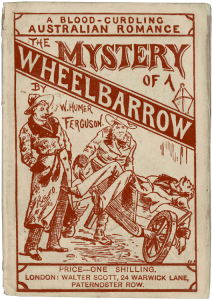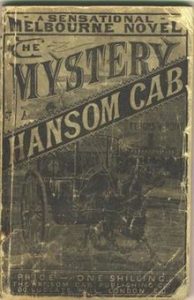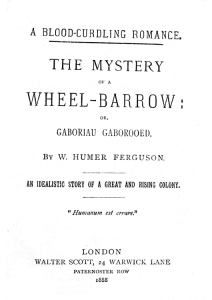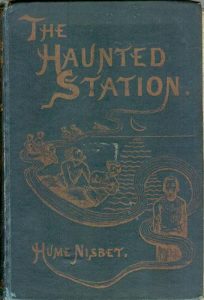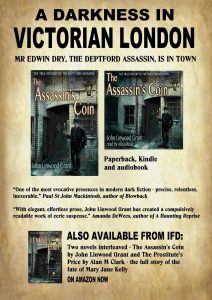A small heap of inter-connected detective trivia today, dear listener. We offer the full text of a classic tale of the supernatural related to the Whitechapel murders of 1888, by period author Hume Nisbet (if you just want to read the story, you can always skip down); a note on the literary roots of Sherlock Holmes, via the world’s best-selling crime novel, by Fergus Hume – and an ill-fated Victorian wheelbarrow. Two and a half Humes for the price of one.
Many have discussed the inspiration for Arthur Conan Doyle’s consulting detective – both real life characters who might have inspired Doyle, and Holmes’s fictional antecedents. We shall not confuse you with reams of references – others with far better credentials and more time have done so elsewhere. But we do enjoy one particular line of enquiry, which relates to Doyle’s book A Study in Scarlet (1887), where Watson mentions two fictional detectives, and has them soundly dismissed by Holmes:
“It is simple enough as you explain it,” I said, smiling. “You remind me of Edgar Allen Poe’s Dupin. I had no idea that such individuals did exist outside of stories.”
Sherlock Holmes rose and lit his pipe. “No doubt you think that you are complimenting me in comparing me to Dupin,” he observed. “Now, in my opinion, Dupin was a very inferior fellow. That trick of his of breaking in on his friends’ thoughts with an apropos remark after a quarter of an hour’s silence is really very showy and superficial. He had some analytical genius, no doubt; but he was by no means such a phenomenon as Poe appeared to imagine.”
“Have you read Gaboriau’s works?” I asked. “Does Lecoq come up to your idea of a detective?”
Sherlock Holmes sniffed sardonically. “Lecoq was a miserable bungler,” he said, in an angry voice; “he had only one thing to recommend him, and that was his energy. That book made me positively ill. The question was how to identify an unknown prisoner. I could have done it in twenty-four hours. Lecoq took six months or so. It might be made a text-book for detectives to teach them what to avoid.”
I felt rather indignant at having two characters whom I had admired treated in this cavalier style. I walked over to the window, and stood looking out into the busy street. “This fellow may be very clever,” I said to myself, “but he is certainly very conceited.”
A number of listeners may know of Poe and Dupin, but how many know of Gaboriau and Lecoq. Read on…
Fergus Hume
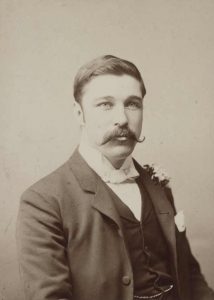
Fond of such Victorian trivia trails, we were browsing the works of Fergus Hume (1859-1932) the other day, and were reminded again of Gaboriau. Ferguson Wright Hume was an Englishman whose family emigrated to Australasia in 1862, and who later became a hugely prolific author. In his early days, having failed to find a publisher, he self-published his detective novel The Mystery of a Hansom Cab in 1886 – the year before A Study in Scarlet was published.
It was a resounding success, first in Australia, then in Britain and the United States – outselling A Study in Scarlet, by the way. It is probably the only one of his many, many works which is still known reasonably well today. Most are utterly forgotten.
In the preface to The Mystery of a Hansom Cab, Hume wrote:
I enquired of a leading Melbourne bookseller what style of book he sold most of. He replied that the detective stories of Gaboriau had a large sale; and as, at this time, I had never even heard of this author, I bought all his works—eleven or thereabouts—and read them carefully. The style of these stories attracted me, and I determined to write a book of the same class; containing a mystery, a murder, and a description of low life in Melbourne. This was the origin of the “Cab.”
The French writer, Emile Gaboriau (1832-1873) wrote five novels which included his methodical detective Monsieur Lecoq (Mister Rooster), beginning with L’Affaire Lerouge (1866). Lecoq was also a master of disguise, an area in which Holmes prided himself. In fact, Conan Doyle admitted being influenced, and said of the French writer:
‘Gaboriau had rather attracted me by the neat dovetailing of his plots, and Poe’s masterful detective, M. Dupin, had from boyhood been one of my heroes. But could I bring an addition of my own?’
Gaboriau has been described as the first writer to invent a true procedural detective, a man making careful observation of the crime scene and then attempting logical deductions from his reading of the scene.
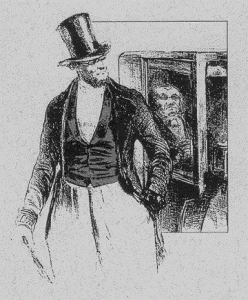
Anyway, back in Australia, such was the impact made by The Mystery of a Hansom Cab that it was even parodied, particularly in a novel written by unknown hand in 1888 – The Mystery of a Wheelbarrow, or Gaboriau Gaborooed, an Idealistic Story of a Great and Rising Colony, by ‘W. Humer Ferguson’.
“On the —th day of 18 —(anno domini one thousand eight hundred and a dash), at the hour of twenty minutes to two o’clock in the morning (our contemporaries will, doubtless, be less precise in their chronology), a wheel-barrow was being propelled along Grey Street, St. Kilda, by a biped in a condition of ‘modified sobriety.’ The vehicle was stopped at the police station, where the propellor solicited the favour of being provided with a ‘drop o’ Scosh ‘ot.’ This being politely but firmly refused him, the man cursorily observed that ‘corpses wasn’t particular pleasant articles to (hic) cart about in an adjectived wheel-barrer,’ and requested the pleasure of an introduction to the inspector.
The vehicle in question stands in, naturally, for the hansom cab in Fergus Hume’s original story:
Several hours were pleasantly whiled away in the discussion of the engrossing subject, but Fitzdoodle O’Brier sat moodily cracking nuts, seemingly bent on finding the whole mystery in a nut-shell. The veracious Leo now fetched from the backyard the wheel-barrow kept for the convenience of over-festive habitués of the “Kilted Opossum.”
NB. It’s also tempting to think that the Irish poet and suspect in the book, Fitzdoodle O’Brier, bears some relationship to the widely-published Irish-American author and playwright Fitz James O’Brien (1826-1862), who was noted for his weird and speculative stories.
You can have a look at the parody here – it has its amusing moments:
http://gutenberg.net.au/ebooks18/1800321h.html
There’s a lot more that could be said about Fergus Hume – he was homosexual, which caused him problems – and his writing, such his novel A Son of Perdition (1912), dedicated to the theosophist Annie Besant. This one is described as an occult romance! However, space forbids for the moment. A number of Hume’s books can be found free on-line, should you wish to pursue him.
We are not done with Humes and Australias, however, because there is another writer worth noting, and one who was also on our radar for their occult or supernatural works…
The Second Hume
(James) Hume Nisbet (1849-1923) was a Scot who similarly left for Australasia, though he was more of a wanderer, and returned to Britain for long periods. In the ghostly tales field, he may be best known for his outback story ‘The Haunted Station.’ Nisbet was familiar with Melbourne, and was touring Australia and New Guinea in the year in which The Mystery of a Hansom Cab was published. Alas we do not know if the two Humes ever met.
Returning to Britain in financial difficulties, he proceed to write a number of novels, adding collections of ghost stories such as The Haunted Station (1894). The piece which follows, ‘The Demon Spell’ is from that book, and was therefore written within five or so years of the Autumn of Terror, when the killer some call Jack the Ripper, murdered and mutilated street-working women in London’s Whitechapel.
‘The Demon Spell’ is thus an early example of fiction reflecting on the events of autumn 1888, and seeking a less mundane explanation than a human murderer. Nisbet employs the same bloody crime and type of victim, the name Polly (reminiscent of ‘Polly’ Nichols), and the same location, Whitechapel. He also features the use of a medium through which the ‘Ripper’ victim speaks – there were a number of claimed events like this at the time.
It’s a strange story, what you might call early weird fiction rather than simple horror, with an ambiguous resolution, but well worth a read.
An audio reading is also available here: https://horrorbabble.bandcamp.com/album/the-demon-spell
The Demon Spell
Hume Nisbet
It was about the time when spiritualism was all the craze in England, and no party was reckoned complete without a spirit-rapping séance being included amongst the other entertainments. One night I had been invited to the house of a friend, who was a great believer in the manifestations from the unseen world, and who had asked for my special edification a well–known trance medium. ‘A pretty as well as heaven-gifted girl, whom you will be sure to like, I know’ he said as he asked me.
I did not believe in the return of spirits, yet, thinking to be amused, consented to attend at the hour appointed. At that time I had just returned from a long sojourn abroad, and was in a very delicate state of health, easily impressed by outward influences, and nervous to a most extraordinary extent.
To the hour appointed I found myself at my friend’s house, and was then introduced to the sitters who had assembled to witness the phenomena. Some were strangers like myself to the rules of the table, others who were adepts took their places at once in the order to which they had in former meetings attended. The trance medium had not yet arrived, and while waiting upon her coming we sat down and opened the seance with a hymn.
We had just furnished(sic) the second verse when the door opened and the medium glided in, and took her place on a vacant set by my side, joining in with the others in the last verse, after which we all sat motionless with our hands resting upon the table, waiting upon the first manifestation from the unseen world.
Now, although I thought all this performance very ridiculous, there was something in the silence and the dim light, for the gas had been turned low down, and the room seemed filled with shadows; something about the fragile figure at my side, with her drooping head, which thrilled me with a curious sense of fear and icy horror such as I had never felt before.
I am not by nature imaginative or inclined to superstition, but, from the moment that young girl had entered the room, I felt as if a hand had been laid upon my heart, a cold iron hand, that was compressing it, and causing it to stop throbbing. My sense of hearing also had grown more acute and sensitive, so that the beating of the watch in my vest pocket sounded like the thumping of a quartz-crushing machine, and the measured breathing of those about me as loud and nerve disturbing as the snorting of a steam engine. Only when I turned to look upon the trance medium did I become soothed; then it seemed as if a cold-air wave had passed through my brain, subduing, for the time-being, those awful sounds.
‘She is possessed,’ whispered my host on the other side of me. ‘Wait, and she will speak presently, and tell us whom we have got beside us.’ As we sat and waited the table moved several times under our hands, while knockings at intervals took place in the table and all round the room, a most weird and blood-curdling, yet ridiculous performance, which made me feel half inclined to run out with fear, and half inclined to sit still and laugh; on the whole, I think, however, that horror had the more complete possession of me.
Presently she raised her head and laid her hand upon mine, beginning to speak in a strange monotonous, far away voice, ‘This is my first visit since I passed from earth-life, and you have called me here.’ I shivered as her hand touched mine, but had not strength to withdraw it from her light, soft grasp. ‘I am what you would call a lost soul; that is, I am in the lowest sphere. Last week I was in the body, but met my death down Whitechapel way. I was what you call an unfortunate, aye, unfortunate enough. Shall I tell you how it happened?’
The medium’s eyes were closed, and whether it was my distorted imagination or not, she appeared to have grown older and decidedly debauched-looking since she sat down, or rather as if a light, filmy mask of degrading and soddened vice had replaced the former delicate features.
No one spoke, and the trance medium continued: ‘I had been out all that day and without any luck or food, so that I was dragging my wearied body along through the slush and mud for it had been wet all day, and I was drenched to the skin, and miserable, ah, ten thousand times more wretched than I am now, for the earth is a far worse hell for such as I than our hell here.
I had importuned several passers by as I went along that night, but none of them spoke to me, for work had been scarce all this winter, and I suppose I did not look so tempting as I have been; only once a man answered me, a dark-faced, middle-sized man, with a soft voice, and much better dressed than my usual companions.
‘He asked me where I was going, and then left me, putting a coin into my hand, for which I thanked him. Being just in time for the last public-house, I hurried up, but on going to the bar and looking at my hand, I found it to be a curious foreign coin, with outlandish figures on it, which the landlord would not take, so I went out again to the dark fog and rain without my drink after all.
‘There was no use going any further that night. I turned up the court where my lodgings were, intending to go home and get a sleep, since I could get no food, when I felt something touch me softly from behind like as if someone had caught hold of my shawl; then I stopped and turned about to see who it was.
‘I was alone, and with no one near me, nothing but fog and the half light from the court lamp. Yet I felt as if something had got hold of me, though I could not see what it was, and that it was gathering about me.
‘I tried to scream out, but could not, as this unseen grasp closed upon my throat and choked me, and then I fell down and for a moment forgot everything.
‘Next moment I woke up, outside my own poor mutilated body, and stood watching the fell work going on–as you see it now.’
Yes I saw it all as the medium ceased speaking, a mangled corpse lying on a muddy pavement, and a demoniac, dark, pock-marked face bending over it, with the lean claws outspread, and the dense fog instead of a body, like the half formed incarnation of muscles.
‘That is what did it, and you will know it again.’ she said, ‘I have come for you to find it.’
‘Is he an Englishman?’ I gasped, as the vision faded away and the room once more became definite.
‘It is neither man nor woman, but it lives as I do, it is with me now and may be with you to-night, still if you will have me instead of it, I can keep it back, only you must wish for me with all your might.’
The seance was now becoming too horrible, and by general consent our host turned up the gas, and then I saw for the first time the medium, now relieved from her evil possession, a beautiful girl of about nineteen, with I think the most glorious brown eyes I had ever before looked into.
‘Do you believe what you have been speaking about?’ I asked her as we were sitting talking together.
‘What was that?’
‘About the murdered woman.’
‘I don’t know anything at all. Only that I have been sitting at the table. I never know what my trances are.’ Was she speaking the truth? Her dark eyes looked truth, so that I could not doubt her. That night when I went to my lodgings I must confess that it was some time before I could make up my mind to go to bed. I was decidedly upset and nervous, and wished that I had never, gone to this spirit meeting, making a mental vow, as I threw off my clothes and hastily got into bed, that it was the last unholy gathering I would ever attend.
For the first time in my life I could not put out the gas, I felt as if the room was filled with ghosts, as if this pair of ghastly spectres, the murderer and his victim, had accompanied me home, and were at that moment disputing the possession of me, so instead, I pulled the bedclothes over my head, it being a cold night, and went that fashion off to sleep.
Twelve o’clock! and the anniversary of the day that Christ was born. Yes, I heard it striking from the street spire and counted the strokes, slowly tolled out, listening to the echoes from other steeples, after this one had ceased, as I lay awake in that gas-lit room, feeling as if I was not alone this Christmas morn. Thus, while I was trying to think what had made me wake so suddenly, I seemed to hear a far off echo cry ‘Come to me.’ At the same time the bedclothes were slowly pulled from the bed, and left in a confused mass on the floor.
‘Is that you, Polly?’ I cried, remembering the spirit seance, and the name by which the spirit had announced herself when she took possession. Three distinct knocks resounded on the bedpost at my ear, the signal for ‘Yes.’
‘Can you speak to me?’
‘Yes,’ an echo rather than a voice replied, while I felt my flesh creeping, yet strove to be brave. ‘Can I see you?’
‘No!’
‘Feel you?’ Instantly the feeling of a light cold hand touched my brow and passed over my face. ‘In God’s name what do you want?’
‘To save the girl I was in tonight. It is after her and will kill her if you do not come quickly.’
In an instant I was out of the bed, and tumbling my clothes on any way, horrified through it all, yet feeling as if Polly were helping me to dress. There was a Kandian dagger on my table which I had brought from Ceylon, an old dagger which I had bought for its antiquity and design, and this I snatched up as I left the room, with that light unseen hand leading me out of the house and along the deserted snow-covered streets. I did not know where the trance medium lived, but I followed where that light grasp led me through the wild, blinding snow-drift, round corners and through short cuts, with my head down and the flakes falling thickly about me, until at last I arrived at a silent square and in front of a house which by some instinct, I knew that I must enter.
Over by the other side of the street I saw a man standing looking up to a dimly-lighted window, but I could not see him very distinctly and I did not pay much attention to him at the time, but rushed instead up the front steps and into the house, that unseen hand still pulling me forward.
How that door opened, or if it did open I could not say, I only know that I got in, as we get into places in a dream, and up the inner stairs, I passed into a bedroom where the light was burning dimly. It was her bedroom, and she was struggling in the thug-like grasp of those same demon claws, and the rest of it drifting away to nothingness. I saw it all at a glance, her half-naked form, with the disarranged bedclothes, as the unformed demon of muscles clutched that delicate throat, and then I was at it like a fury with my Kandian dagger, slashing crossways at those cruel claws and that evil face, while blood streaks followed the course of my knife, making ugly stains, until at last it ceased struggling and disappeared like a horrid nightmare, as the half-strangled girl, now released from that fell grip, woke up the house with her screams, while from her releasing hand dropped a strange coin, which I took possession of.
Thus I left her, feeling that my work was done, going downstairs as I had come up, without impediment or even seemingly, in the slightest degree, attracting the attention of the other inmates of the house, who rushed in their nightdresses towards the bedroom from whence the screams were issuing.
Into the street again, with that coin in one hand and my dagger in the other I rushed, and then I remembered the man whom I had seen looking up at the window. Was he there still? Yes, but on the ground in a confused black mass amongst the white snow as if he had been struck down.
I went over to where he lay and looked at him. Was he dead? Yes. I turned him round and saw that his throat was gashed from ear to ear, and all over his face–the same dark, pallid, pock-marked evil face, and claw-like hands, I saw the dark slashes of my Kandian dagger, while the soft white snow around him was stained with crimson life pools, and as I looked I heard the clock strike one, while from the distance sounded the chant of the coming waits, then I turned and fled blindly into the darkness
END
